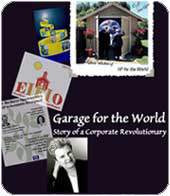|
|

Prior Quotes of the Week
First Quarter, 2001
(Titles that are linked may be ordered online.)
The
Dancer
& The Dance |
|
|  ...The microcomputer industry has been with
us for a decade and a half. We have poured staggering sums down its insatiable
maw. It is time to face an unpleasant fact: the so-called microcomputer
revolution has cost much more than it has returned. One problem is that
microcomputers are vastly more complex that the tasks ordinarily asked
of them. To write a report on a machine with a Pentium II processor, sixty-four
megabytes of memory, and an eight-gigabyte hard disk is like leasing the
space shuttle to fly from New York to Boston to catch a Celtics game.
Though there are those who wouldn't hesitate to do such a thing if the
could afford it (or get it subsidized, which is more to the point), we
follow their lead to great peril....
...The microcomputer industry has been with
us for a decade and a half. We have poured staggering sums down its insatiable
maw. It is time to face an unpleasant fact: the so-called microcomputer
revolution has cost much more than it has returned. One problem is that
microcomputers are vastly more complex that the tasks ordinarily asked
of them. To write a report on a machine with a Pentium II processor, sixty-four
megabytes of memory, and an eight-gigabyte hard disk is like leasing the
space shuttle to fly from New York to Boston to catch a Celtics game.
Though there are those who wouldn't hesitate to do such a thing if the
could afford it (or get it subsidized, which is more to the point), we
follow their lead to great peril....
Please don't misunderstand. This is not a neo-Luddite
plea to toss computers out the window. I am, after all, a computer science
professor, and I am certainly not ready (as the militias in my part of
the country put it) to get off the grid. Further, the social benefits
of computing – from telecommunications to business transactions to
medicine to science – are well known....
Putting microcomputers in their place will also have
a salutary effect on my discipline. We in computer science could then
begin to claim that our field – like mathematics, like English literature,
like philosophy – is a marvelous human creation whose study is its
own reward. To study computer science calls for concentration, discipline,
even some amount of deferred gratification, but it requires neither Windows
98, nor a four-hundred-megahertz Pentium II processor, nor a graphical
Web browser. Though I am tempted, I will not go so far as to say that
the introductory study of computer science requires no computing equipment
at all (though Alan Turing did some pretty impressive work without a microcomputer
budget). We do seem, however, to have confused the violin with the concerto,
the pencil with the theorem, and the dancer with the dance.
I am afraid that we in computing have made a Faustian
bargain. In exchange for riches, we are condemned to a lifetime of conversations
about the World Wide Web. An eternity in hell with Dr. Faustus, suffering
the torments of demons, would be an afternoon in the park by comparison. |
| |
|
| Dreaming
to Greatness |
|
|  How
I thought the world worked was, if you were great, like Martin Luther
King Jr., you had a dream. Since I wasn't great, I figured I had no dream
and the best I could do was follow someone else's. Now I believe it works
like this: It's having the dream that makes you great. It's the dream
that produces the greatness. It's the dream that draws others around us
and attracts the resources it takes to accomplish the dream. How
I thought the world worked was, if you were great, like Martin Luther
King Jr., you had a dream. Since I wasn't great, I figured I had no dream
and the best I could do was follow someone else's. Now I believe it works
like this: It's having the dream that makes you great. It's the dream
that produces the greatness. It's the dream that draws others around us
and attracts the resources it takes to accomplish the dream.
|
| |
Quote #201: 2001.01.05 |
Other Prior Quotes:
Fourth Quarter, 2000
Third Quarter, 2000
Second Quarter, 2000
First Quarter, 2000
Fourth Quarter, 1999
Third Quarter, 1999
Second Quarter, 1999
First Quarter, 1999
Fourth Quarter, 1998
Third Quarter, 1998
Second Quarter, 1998
First Quarter, 1998

copyrights,
terms and conditions
20001010.8110.wtj
|













